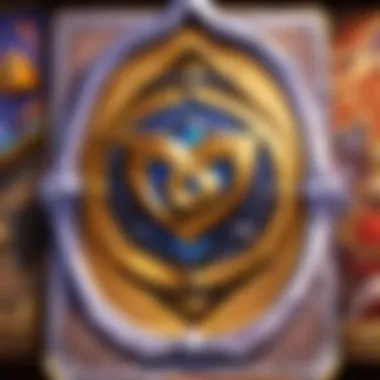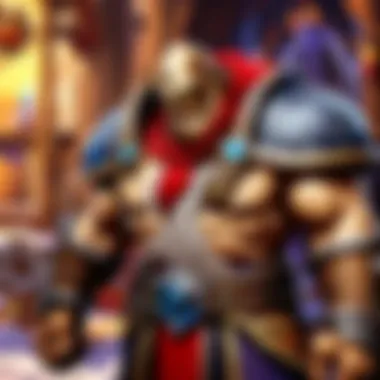The Devolution Process: Strategic Insights in Hearthstone


Intro
Devolving, as a concept in Hearthstone, provides unique nuances in gameplay dynamics. The way cards shift from one state to another introduces layers of complexity, affecting strategy and deck-building decisions significantly. Understanding this evolving concept is essential for aspiring players who wish to master the currently competitive landscape of the game. This section will set the tone for an in-depth exploration of devolving mechanics, and their strategic implications.
Game Updates and Patches
Recent game updates and patches play a crucial role in altering the landscape of Hearthstone strategies, including the domain of devolving. Keeping abreast of these changes ensures that players leverage the current mechanics efficiently.
Overview of the Latest Game Updates
Seasoned players are aware that Hearthstone frequently releases updates which may influence how devolving operates. Notably, patch notes outline adjustments made to core mechanics, along with balancing tweaks to several cards. For instance, some recent adjustments have enhanced consumer perception of value concerning certain lower-tier cards that serve as devolve targets.
Detailed Breakdown of Changes
Assessing change in devolve mechanics requires examining specific instances in the patch notes. For instance, changes can lead to a re-evaluation of card synergies. If popular cards spawn from a patch, players should adapt their play styles accordingly. And sometimes buffed or debuffed cards force a tech innovation just to counter brute strength in various formats.
Analysis of New Cards and Mechanics
Many new cards have introduced unique mechanics that interact with help and hinder devolving strategies. For example, consider a new card that promotes the evolution of minions in hand. Such dynamics shift players' tactics since they can supplement typical deprivation strategies. Merging new tactics compelled by evolving cards leads players to experiment at various levels, thereby influencing gameplay comprehensively.
Deck Strategies and Meta Analysis
Exploring the implications of devolving extends past mechanics to how it shapes deck strategies.
Top Deck Recommendations
Players often wield decks tailored to specific play styles. Some efficient archetypes highly utilize devolving, maintaining versatility and surprise against an opponent. For aggressive play, a tempo-focused deck might employ cards like Shaman's Devolve. Meanwhile, control-focused players often prepare varied strategies, leveraging devolving wisely.
Insight Into the Current Meta
In the evolving meta, some characters gain more relevance than others. Several team compositions trend and detracts from popularity based on card efficiency. Thus, understanding popular deck archetypes equips players better for facing common opponents in varied matches.
Strategies for Countering Popular Decks
Dismissing the direct dynamic of devolving without regard for current counters remains significant for mastery. Tec choices around perpetuating greater variances can help build decks positioned well against formidable opponents. Each competitive cycle brings new routes for counter-play or exploitation of enemy strategies centered on dealing more with devolve practices.
Card Reviews and Set Reviews
To fully grasp the devolving concept, one must examine specific cards supporting the dynamics mentioned.
In-depth Reviews of New Cards
Each card introduced impacts the potential trajectory of evolving play in various ways. An effective devolve card might feature easily activated abilities that do not require committed defensive strategies, thus enhancing their competency in mixed decks.
Evaluations of Card Synergies
Synergy plays an important part in deploying effective strategies, especially when coupled with devolving techniques. Assessing complementary card layouts amplifies an agile play style, which in turn improves collective strategy cohesion.
Set Reviews on Value, Versatility, and Competitive Viability
Finally, set reviews reveal how collective dynamics adjust a player's approach to constructing viable, powerful decks. Reviewing the context meta delivers insight surrounding where to position devolving cards within player's landscapes for frequent success.
Player Guides and Tips


All players, especially beginners, can glean wisdom from many guilds or dedicated communities pored over practical guides and tips regarding evolving frameworks.
Beginner's Guides
For novice players, familiarizing oneself with fundamental game mechanics, including devolve, constructs their foundational strategy. Having successes often means gradually enhancing understanding of basic play styles, such as establishing flowing turns versus static ones.
Advanced Tips for Improving Gameplay
For more experienced players, viewing become thoughtfully nuanced has play become a hallmark of sophisticated understanding. Consider cumulative pathways of decision-making as a tight weapon against established semi-static play styles.
Arena Drafting Strategies
Discussing drafting strategies specifically for utilized operates that revolve around devolving. Some arena drafts enable seeking dynamic traits around player statistics conditioned to change important outcomes as possible deck variances evolve around others.
Prologue to Devolve
The topic of Devolve in Hearthstone encapsulates a key component of the game's strategy. Understanding devolving not only empowers players to make shrewd tactics. It fosters unique situations that can alter the tide during matches considerably. Moreover, this article will dissect how devolving functions, its role in player decision-making, and its broader affect on the game dynamics.
Definition and Context
devolve refers to a mechanic wherein players transform minions into weaker versions, inherently altering gameplay and deck strategies. This activity modifies power dynamics and expectations surrounding card use and opponent capabilities. One cannot overlook the contextual backdrop where devolve appears, as its implications shape not only immediate encounters but also long-term deck-building philosophies in casual and competitive areanas.
Historical Background in Card Games
the concept of devolving has origins beyond Hearthstone, finding roots in various card games. Throughout history, card games have explored mechanics that shift characteristics of card interactions. Games such as Magic: The Gathering have employed similar transformation strategies. This history shapes understanding in Hearthstone. As the genre evolved, injection of innovate mechanisms helped distinguish card games by fueling complicated interactions, such as merging traditional play with exponential craziness you might expect.
How do these transformations beauty experience for players? heatstone goes beyond mere depletion of resources to create engaging game interactions. By analyzing the history of similar mechanics, we become more prepared to address current challenges in-game strategiez.
Mechanics of Devolve in Hearthstone
The mechanics of devolve is a key aspect of Hearthstone, encapsulating how players can shift the trajectory of a match. Understanding this mechanism is critical for players seeking a competitive edge. Devolving cards can alter the board state, making them powerful tools when used effectively. Key considerations include recognizing the timing of using devolve cards and anticipating opponent reactions.
Understanding Card Transformations
In the realm of Hearthstone, the ability to transform cards is not merely a gimmick; it represents a strategic pivot from one potential outcome to another. The transforming process typically involves changing a player's minion into lower-cost creatures. For instance, using the card Devolve affects all minions on the enemy board. By converting a high-value minion into smaller, less impactful versions, players can effectively neutralize threats.
The transformations adhering to devolve mechanics leverage randomness and can turn the tide dramatically with a bit of luck. This randomness might frustrate some players, but when implemented with a tactical mindset, it can provide substantial advantages.
Additionally, every character is subject to the types of cards in the player's deck and the current state of play. A keen understanding of probabilities and card synergy increases effectiveness while devolving minions. For instance, realizing how to best utilize Evolve following a devolve can create opportunities for more powerful summonings after a board reset, enhancing overall deck strategy.
Interactions with Other Game Mechanics
Devolve does not function in isolation; it interacts with multiple game mechanics within Hearthstone. Such interactions encompass various strategies that include card draw, buffs, and direct removals. For example, a devolve ability influences a player's decision to hold or play specific cards, particularly when decklisting for a cohesive strategy.
Moreover, the interface between devolving and crowd control or area denial strategies emphasizes its value. Cards like Hex and Polymorph share similar ambitions but have varying mechanics and results. These interactions can be crucial in mid-game where board positioning often dictates income in future rounds.
When employing devolving cards, considering their role alongside drawing strategies ensures that adverse conditions do not arise as an intention fails. For instance, recognizing when druids have potential resets in their hands is a deciding factor between being proactive with devolving or safeguarding for later use.
In sum, understanding the mechanics of devolve in Hearthstone is vital. Assessments must include potential transformations and their repercussions in relation to other actions performed on the battlefield.
Strategic Implications of Devolving
Understanding the strategic implications of devolving is critical for any player looking to maximize their effectiveness in Hearthstone. Devolve, as a mechanic, does not simply represent a choice on the battlefield; it alters the entire playing field by manipulating both individual cards and overall strategies. Players must grasp not just when to deploy this action, but also how it shapes the dynamics of a match through its influence on decision-making and tempo shifts. The recognition of these implications allows players to exploit opportunities that other competitors might overlook, elevating their gameplay resourcefully.
When to Utilize Devolve


Identifying the optimal moments to utilize devolve is paramount for exploiting its full potential. Timing can make or break a turn. Here are some key considerations for players:
- Assess Your Opponent’s Board State: Evaluate what threats oppose you. If they have strong minions, devolving them may mitigate potential damage and bolster your response time.
- Resource Management: Understanding when to use evolve effects often relates to resource disparity. Keeping track of card counts for both players enables more precise decisions. If the opponent is running low on resources, utilizing devolve can gain a decisive advantage.
- Game Momentum: Sometimes, the risk of transforming an opponent's powerful card is worth the potential reward. Use devolve to flip the momentum in your favor, especially when gameplay appears to stagnate.
- Prepare for Counter Moves: Engage when the deck reveals specific strategies that could counter your continued pressure. Disturbing your opponent’s rhythm by employing devolve can sow chaos.
Case Studies in Competitive Play
In examining the strategic applications of devolve, specific case studies exemplify its potency in competitive play. Noted matches can illustrate how adept players used devolve as a tactic:
- World Championship Finals (2020): One crucial moment established the effectiveness of devolve when player Samuro was faced with a crucial opponent's board. Instead of full aggression, his slight recalibration to devolve key minions, leading to reduced damage per turn—a move that shifted overall board control and set the table for victory.
- Top Ranked Decks Analysis: Many successful decks utilize amalgamations that hinge heavily on the strategy of devolving at the right moment. Players frequently test their builds to indicate precisely where devolve maneuvers can act as pivot points.
Through these examples, it becomes clear that effective utilization of devolve transcends mere card play; it represents a fundamental aspect of strategic planning and psychological manipulation.
By studying such case studies, it becomes evident that the implications of devolving should not be taken lightly. Each matchup has a unique landscape which can be divined using sharp judgment and knowledge of potential chained consequences. All players must weave such factors into their planning for coherent execution, demonstrating excellent mastery of devolve processes.
Psychological Effects of Devolving
Understanding the psychological effects of devolving in Hearthstone is critical for both novice and seasoned players. The way players respond to devolving mechanics can significantly influence their decision-making process and overall gameplay experience. The emotional challenges that come with these strategies offer a key lens to assess competitive behavior and can enhance comprehension of player response dynamics. By studying these effects, one can refine not only their strategic acumen but also predict opponent tactics in crucial matchups.
Impact on Player Decision-Making
The process of devolving directly impacts the decisions players make during matches. When faced with the threat of a devolve card, players often experience heightened caution and anxiety. These emotions shape their strategic choices, causing them to reconsider aggressive plays or riskier maneuvers.
Several specific factors affect decision-making:
- Choice Anxiety: Players may worry about generating weaker minions or losing crucial abilities, leading them to opt for safer plays.
- Adaptive Strategies: To counter the devolving mechanic, players may adjust their deck composition. Tested mitigation strategies might include playing cards resistant to devolving or focusing on board control.
- Opponent Engagement: Awareness of one's own and the opponent's deck modifications may elicit changes in approaching deck strategies. Some players may sway towards defensive positions instead of employing their standard offensive tactics.
In high-stakes scenarios, the fear of losing momentum may overshadow the glory of a bold strategy.
Decision-making is influenced not just by strategy, but by the anticipation of opponents’ reactions. Careful consideration of risks becomes paramount.
Emotional Responses to Devolve Strategies
Devolving mechanics provoke a range of emotional responses that affect player performance. Each reaction can shape how a player approaches the game, making these psychological dynamics worth exploring in depth.
These responses can include:
- Frustration: A frequent emotion among players upon witnessing the transformation of strong minions. This can lead to tilting and detracting from optimal performance.
- Empowerment: Conversely, when wielding a devolve card, players may feel a sense of control over the game dynamics. Leveraging the ability to diminish an opponent's strengths can bolster confidence.
- Disappointment: The randomness inherent in devolving can lead players to experience disappointment based on the transformed outcomes that do not meet expectations. Such discontent can impact future decision-making.
Engaging with emotions tied to these strategies fosters a deeper appreciation for the game, prompting players to reflect on their psychological resilience and adaptability. Understanding these patterns distracts from gameplay deficiency and allows opponents to be played, rather than mechanics themselves.
Consequently, emotional fluctuations revealed in competitive scenarios dictate personal strategies and formulate responses needed for effective revels in Hearthstone’s dynamic duels. The balance between cognitive evaluation and emotional reaction creates a complex gameplay atmosphere that demands both skillful planning and psychological endurance.
The Broader Impact of Devolve on Game Dynamics
The topic of devolving has significant implications in the game dynamics of Hearthstone and its environment. Understanding these implications involves assessing the changes in gameplay mechanics, balance, and community interaction. Every match can present a different range of scenarios, and the concept of devolving affects player choices, deck strategies, and overall game experiences.
Balance Issues Arising from Devolve Cards
Devolve cards introduce a layer of complexity and unpredictability in gameplay. They can alter the balance of power during a match. By changing powerful cards into weaker counterparts, a player can drastically shift the rhythm of the game. This mechanism can lead to balance issues, particularly in how various classes interact. The act of devolving can disproportionately affect specific classes, making some struggles problematic.
Consider the following points about balance issues:
- Card Value: Once high-value cards devalue based on inconsistent outcomes, players may feel discouraged. This aspect could lead to shifts in card selection and usage strategies.
- Meta Adaptation: The presence of strong devolve mechanics encourages a meta that leans heavily on constructing decks that can either counter or exploit this mechanic. However, this adaptive roundabout can result in cards taking center stage at unfair odds.
- Playability and Potential: Constant interaction with devolving effects means the potential for a card to vary significantly from expected value. A classic example is when a well-built combo is rendered indolent because of a devolve effect, frustrating planters.


Such balance issues can reframe perceptions about existing mechanics and cause developers to reassess card viability. The ongoing adjustments to balance can shift player focus back and forth between underused cards, creating cycles in deck composition.
Community Response and Adaptation
The Hearthstone community has exhibited remarkable adaptability to the mere presence of devolve cards. As competitive players encounter devolving strategies, their responses form various layers of gameplay adaptations. Players often seek to learn from each challenge by breaking down how interactions function and conserving fresh deck constructions.
Community responses include:
- Deck Performance Sharing: Players actively share successful deck lists that exploit the advantages of devolving playoff and join discussions to understand their frameworks better. Platforms such as Reddit and social forums act as channels for these exchanges.
- Strategic Refinements: There are numerous channels showing how expert players refine their strategies for a developed format. Engagements focus not only on offensive options but also on defensive answers to devolving threats.
- Game Design Conversations: Community feedback influences evolutionary paths of card design in company discourse. Players raising their methodologies result in incremental enhancements being enjoyed over intervals.
Future of Devolve in Hearthstone
The evolution of sports lik Hearthstone continues to captivate and challenge its community. Devolving remains an integral element, carving out unique interactions that deeply influence gameplay. Understanding its future provides a roadmap for players to navigate the complexities of upcoming expansions and balance changes related to devolve cards. As additional content is released, the developers’ intention to enhance, shift or even enforce existing mechanics becomes vital, making this discussion relevant for all players who aim for advancement in their strategies.
Evolution of Devolve Mechanisms
The foundations of devolve have experienced considerable transformation since its inception. New interpretations of existing cards, mechanics, or combos can circulate widely within the community, affecting both meta choices and strategies.
One of the prominent trends expected to unfold is the refinement or reworking of existing devolve mechanics. Players may see developers adjusting the interaction rules for specific cards. This could involve altering the probability distribution of card transformations, smoothing aggressive play and better decision-making for all players.
Moreover, devolving might integrate with emergent gameplay mechanics, promoting unpredictable outcomes and richer strategic planning. Anticipating these changes requires keen observation of community discussions and developer announcements.
Some key points to consider in this evolution include:
- Greater Variability: Expect more focus on unique transformation results, creating a diverse game environment.
- Evolving Strategies: Developing counter strategies against rising devolve effects may strengthen deck diversity.
- Innovative Card Designs: Surprises in card translations could emerge, revealing not just smaller minions but unexpected combo potentials.
“Future adjusting of devolve card sets will significantly shape player expectations and gameplay scenarios.”
Potential Changes in Game Design
The overarching design philosophy of Hearthstone may shift as the developers gather feedback from the player base. Potential updates for devolve may encompass:
- Increased Focus on Skill-Based Challenges: As prowessed card interactions gain traction, the debugging of devolve may involve more acute skill tests for players as they decide how and when to use them.
- The Role of Technology in Card HQ Improvements: Anticipated technological enhancements can improve user experience as players access and master these evolving strategic trends. This could translate into better APIs or game engine modifications.
- Player Feedback Incorporation: Gathering qualitative and quantitative data will likely become commonplace—ultimately helping developers make decisions informed by player experiences.
In summary, prospective alterations present opportunities and challenges alike. Engaging with these changes and adapting is indispensable for those invested in the academic progression of Hearthstone gameplay. Keeping abreast of upcoming cards and related meta shifts will likely yield consistent success in this competitive landscape.
Ending
The concept of devolving represents a unique aspect of gameplay within Hearthstone, combining tactical depth with psychological factors. Understanding the implications of this mechanic allows players to enhance their strategy, making them more adaptable in various in-game situations. Devolution not only alters the state of play through card transformations but also introduces new avenues for player decision-making.
In this context, several key elements emerge:
- Dynamic Shifts in Strategy: Devolve can fundamentally change the board state, leading to shifts in game strategies on the fly.
- Psychological Dimensions: The emotional response invoked when facing devolve mechanics, or employing it against an opponent, can influence player behavior and performance.
- Strategic Resource Management: Applying devolve effectively requires mindful allocation of resources, further enhancing strategic gameplay.
Thus, a deeper grasp of the devolving mechanics not only augments overall gameplay enjoyment but also fosters engagement through more sophisticated strategies in Hearthstone.
Recap of Key Points
In summary, this article delved into:
- Definition and Functionality of Devolve within Hearthstone.
- Mechanics of card transformations and their tactical implications.
- Strategic Advantages when to use devolve effectively in competitive play.
- Psychological Effects of devolve on decision-making and player behavior.
- The Broader Impact and community response to devolve mechanisms.
- Future Directions for evolve mechanics in game design and community engagement.
By synthesizing these components, players are better equipped to navigate the evolving meta within the game.
Final Thoughts on Gameplay Strategy
Understanding devolving strategies can provide notable benefits for Hearthstone aficionados. Players should keep in mind:
- Timing and Placement: The correct timing significantly impacts outcomes. Evaluate when your opponent is most likely unprepared.
- Anticipating Opponent Responses: Skilled players anticipate how others will adapt to devolve moves. An understanding of possible opponent strategies increases your advantage.
- Learning and Adaptation: The game constantly evolves. Learning from your encounters with devolve mechanics can expand one’s tactical repertoire.
Recognition and integration of devolve strategies enhance comprehension of Hearthstone, delivering not only better gameplay but deeper enjoyment of strategic layers. Distinct applications of devolving create an enriching experience, inviting continued exploration of its implications.







